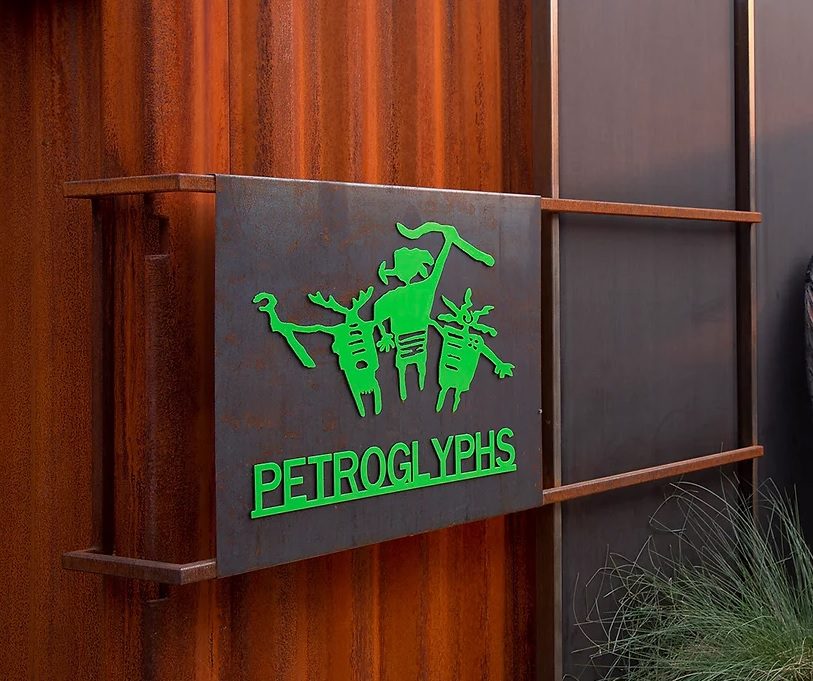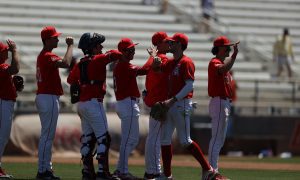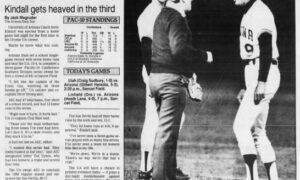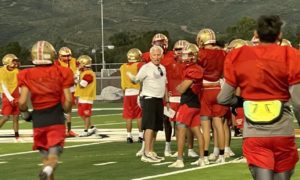Robbie Moen’s baseball coaching and scouting existence has taken him from college to the professional ranks to guiding softball players who are in middle school.
After an 18-year background as hitting coach at Kansas State and Loyola Marymount and scout with the Tampa Bay Rays, Moen was out of work when he moved to Frisco, Texas, last July so he can remain close to his daughters Payton (16 years old) and Paige (13).
Moen, a member of Arizona’s All-Century Team in baseball, discovered a baseball and softball academy called the Frozen Ropes upon arriving at Frisco. The organization’s name is an apt description for Moen’s hits during his career with the Wildcats, which included a .402 average as a sophomore in 1991.
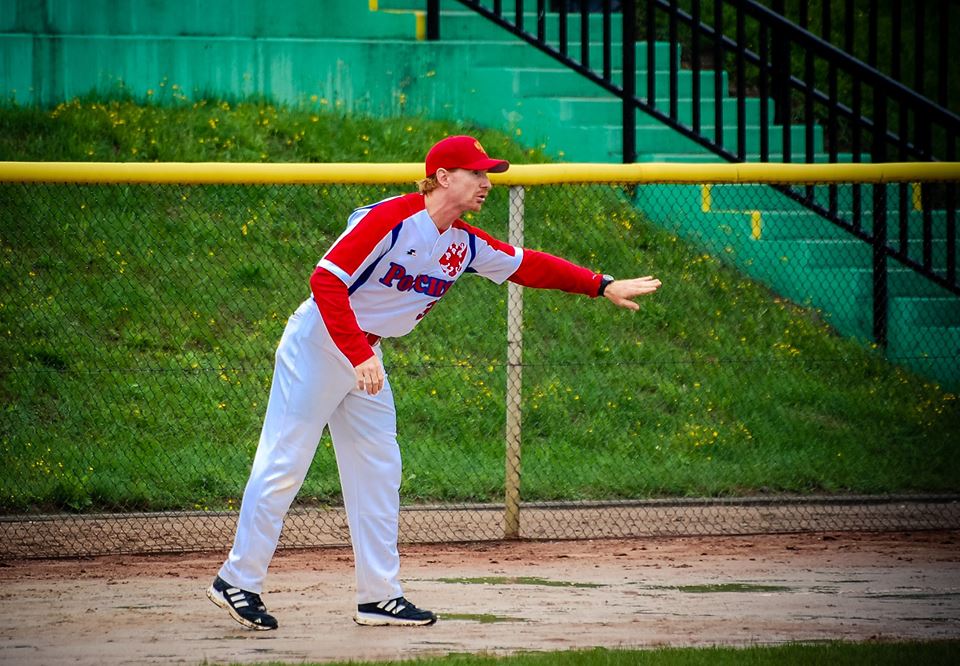
Robbie Moen coaches third base during one of the Russian national team’s baseball games last month (Russian team photo)
He finished his career at Arizona second in career at-bats (843) and doubles (63), third in career hits (325) and total bases (465) and fifth in career RBIs (185).
Moen, 46, moved to Texas from his southern California home when his ex-wife Chrisdee, a former Arizona batgirl, transferred to nearby Plano to work at Toyota’s North American headquarters.
“Basically, I walked in there cold with the Frozen Ropes and told them, ‘Here’s who I am. I need a job giving some lessons. Can you help me?'” Moen said. “They took me right in. I’ve been getting in some lessons from there and I started to coach the 14-and-under softball team.”
Moen also became a substitute teacher in Frisco last school year to supplement his income and begin his quest to be a certified teacher.
“If I didn’t move, then I wouldn’t be able to see my girls,” Moen said. “I moved out here and substitute taught last year, and I’m working on getting a full-time teaching job now. I got a job this upcoming school year teaching P.E. for grades 6 through 10.
“I want to coach. I don’t know what level it’s going to be. I would love to be a high school varsity baseball coach but I also would like to be a head softball coach. I just want to coach. I know that.”
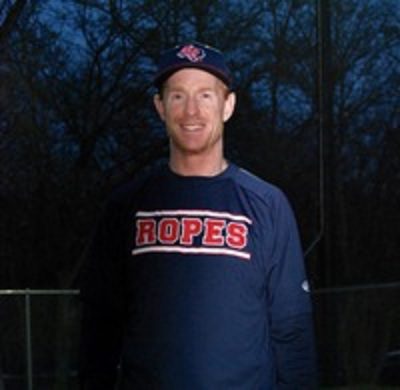
Robbie Moen works as the softball coach for the 14U team of the Frozen Ropes baseball and softball academy in Frisco, Texas
The desire to coach “kind of wavered” for Moen when he stepped down from his position at Loyola Marymount after the 2006 season.
“I had grown tired of it, for whatever reason,” he said. “I just didn’t have it in me. Scouting (for Tampa Bay after that) was great but I didn’t get a chance to put much influence on things, on people’s lives.”
After leaving his scouting job, Moen served as a hitting instructor at two different academies in southern California before moving to Frisco.
“Doing all the lessons and working at camps, working with all the people, I really felt that I can have a big impact on people’s lives,” Moen added. “I have a pretty good way about me to relate to people of all ages, boys and girls. Coaching is a way to get that information across to them. It’s something I am good at. I know I want to continue to do that. It’s a more comfortable environment. ”
Moen’s comfort zone was tested to the extreme recently.
A few months ago, dreading the thought of the slow summer months as a teacher, Moen received a fateful call from his former batting coach and mentor at Arizona — Jerry Stitt.
Stitt initially accepting the role of batting coaching for the Russian national team this summer but was unable to fulfill that commitment because of other obligations. A longtime friend of Stitt’s lives in the Czech Republic and is involved with the development of the Russian team with baseball resuming as an Olympic sport in the 2020 Tokyo Games.
“Stitter called me and said, ‘Are you interested?’ I was like, ‘Hell yeah.’ I am a substitute. I don’t have a full-time job,” Moen said.
Four days passed and Moen did not hear from Stitt’s friend.
“The guy never called me. Never e-mailed me. I never interviewed. I never sent anything in and then all of a sudden I got an e-mail that gave me information about the position,” Moen said. “So I was like, ‘OK, I am the guy?’ He wrote back, ‘Yeah.'”
The original plan called for Moen and fellow Tucsonan Blake Eager to train the Russian team — along with former Seattle relief pitcher Greg McCarthy — in Moscow for two weeks and coach it the following 10 days in a tournament at Prague, Czech Republic.
Eager, a Flowing Wells graduate like Moen, was also summoned by Stitt to coach the Russians as a pitching specialist. Eager, a right-hander, made it to as high as the Double-A level in the New York Mets organization before becoming a coach and trainer.
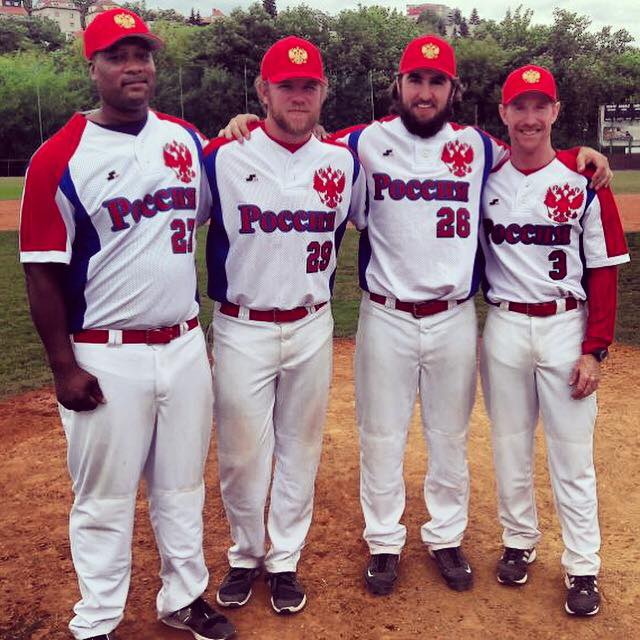
Robbie Moen (far right) standing with coaches Greg McCarthy and Blake Eager (a fellow Tucsonan) and Russian infielder Nikolay Lobanov (Russian team photo)
“Blake went to same high school I did, the same middle school I did, the same elementary school I did, but he is 10 years younger than me,” Moen said. “We never met until this trip. I knew of him but I never knew him personally.”
Eager operates the Hills Baseball Academy in Tucson.
“As it turned out, Blake and I work really well together,” Moen said. “The Russian players really responded to us. They wanted more. The administrative guys liked what they saw. They wanted us to do more so they asked myself and Blake if we would go back to Moscow instead of going home after leaving Prague.
“I was able to but Blake has a business back in Tucson that he needed to get back to run. I was able to go back to Moscow for another two weeks and continue training the players for another tournament in Poland.”
Moen reached that comfort zone — in which he feels he gets the most out of players — in a far away land. It was his first trip outside of North America (he traveled to Canada as a player).
Sergey Kurchenko is listed as the head coach for the Russian team, but he also learned from Moen, who served as the third-base coach during the games. Kurchenko has more of a cricket background in Russia.
And, no, Moen has no insight into Russia’s alleged tampering with the U.S. presidential election last year.
“(Russian president Vladimir) Putin and I had some closed door meetings over there,” Moen said with a laugh. “No, but I did get a lot of flack about (Pres. Donald) Trump and Putin and stuff like that from people over there.”
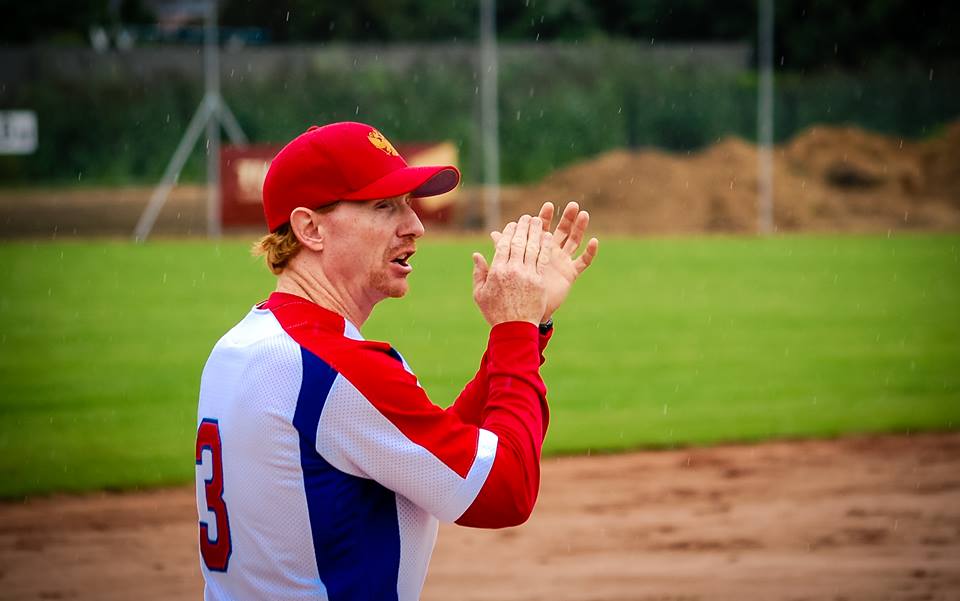
Robbie Moen offers encouragement from the third base coaching box during one of the Russian national team’s games (Russian team photo)
When first meeting the Russian players, whose ages range from 19 to 42, Moen felt like he was getting flack from them for how he and Eager coached.
“There was a lot of hesitancy and resistance in the beginning because these guys didn’t know us,” Moen said. “Some of them are older than Blake. As time went on, our personalities, our energy and the way we coached, I think it was very different and positive that those guys really liked it. They really responded. It was a good thing.”
The Russians became so accepting of Moen and Eager that they went from practicing once or twice a week to welcoming Moen’s insistence that they practice Monday through Friday.
“These guys have full-time jobs. They’re professionals. They have families,” Moen said. “Practicing throughout the week was a huge change for them and they responded. They wanted more so it was definitely a positive experience.”
Some of Moen’s unconventional hitting regimen, learned from his experience under Flowing Wells coach Len Anderson and Stitt at Arizona, amazed the Russians.
He introduced a drill in which they hit the ball standing on one leg, which Moen said helps players “keep their weight back when they load” for the swing. A right-handed batter, for instance, stands on the right leg with the left leg in the air. The player holds the bat next to his left hip pocket.
“As the leg goes down, your hands go back to the hitting position and you should have more weight on your back leg,” Moen explains. “At first, the guys looked at me like, ‘What in the world?’ All of sudden, line drive, line drive and line drive. You can see their eyes turn on. They were like, ‘Wow.’ You see the next guy, he does not even need the drill and he wants to do it.”
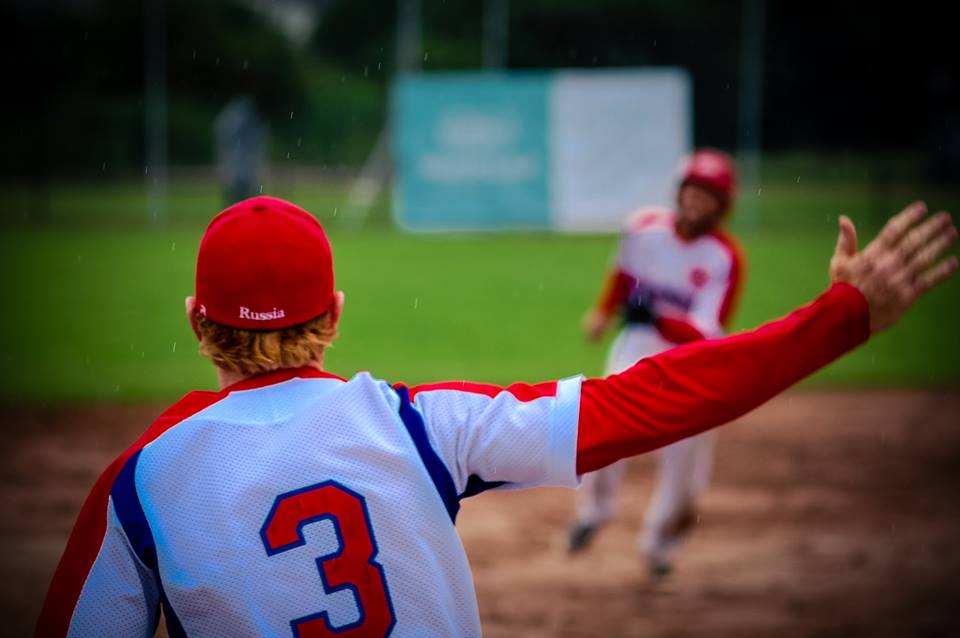
Robbie Moen waves around a runner while coaching third base (Russian national team photo)
Moen communicated to most of the Russians through a translator at the outset. By the end of Moen’s stay there, a translator was not necessary because the players adapted so well to his regimen.
“It wasn’t because they learned the English language or I learned that much Russian where we could have conversations,” Moen said about overcoming the language barrier. “It was because I learned how to become better at demonstrating or drawing pictures in the dirt about what to do or just my motions.
“We talked about it and they were more familiar with it. By the end, We could almost run a full practice without having to have any translation going on which I thought was a huge sign of respect.”
Moen’s extended stay in Moscow allowed him to train the Russians for the European Championship Seniors Tournament in Miejska Gorka, Poland, on July 24-29.
The Russians reached the championship game in which it lost to Lithuania 8-3. It was the second setback to the Lithuanians that week, which did not sit well with Moen, one of the fiercest competitors Jerry Kindall recruited to Arizona.
“We finished second … that was a week ago, and I’m still pissed off about it,” Moen said. “I’m still pissed because it was a team that should not have beat us and while they were beating us talked a lot of (expletive). They were disrespectful to the game.
“I didn’t like anything about them and it started with their coach (Vermidas Neverauskas, whose son Dovydas is a top pitching prospect with the Pittsburgh Pirates).”
Moen completed his two-month stay overseas with a four-day return to Prague, where he helped train the Russian under-23 team that is preparing for a tournament in Brno, Czech Republic, next week. The Russians asked Moen to stay with that team for the tournament, but Moen had to return to Frisco for his P.E. teaching position.
He envisions a return to that part of the world annually after making contacts there, including a Latvian official who wants baseball to prosper in his country. Moen possibly will help train players there.
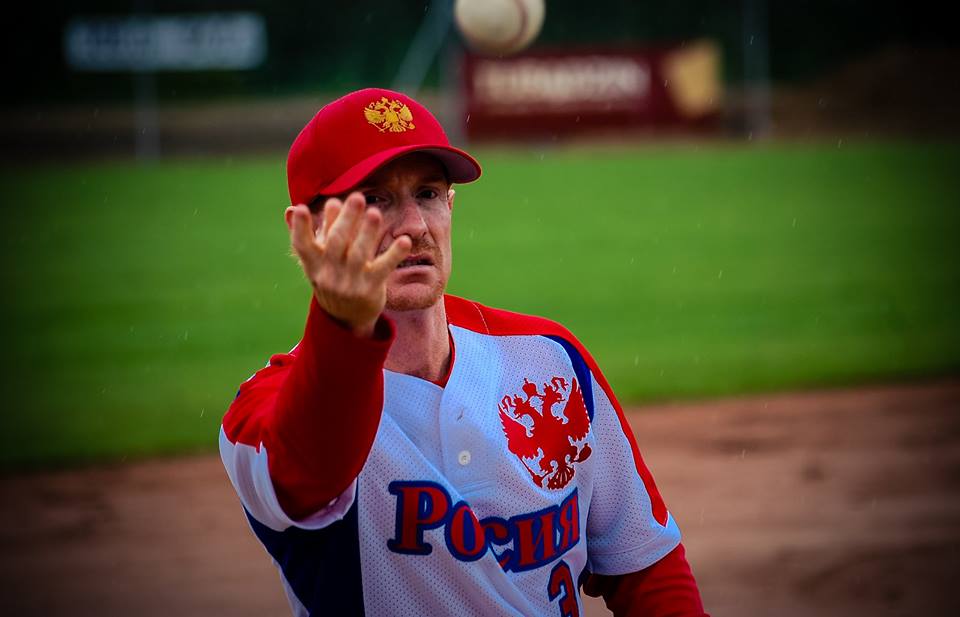
Robbie Moen wants to return to Russia, Czech Republic and Latvia annually to help baseball prosper in those countries (Russian team photo)
“I would hope that this can be an every summer thing,” Moen said. “I would like to take my daughters over there to see Prague and to see Moscow. It’s such a beautiful part of the world.”
Moen talked about the enticing possibility of coaching the Russian national team in the 2020 Olympics. He views that as a potential ticket to finally qualify for Arizona’s Sports Hall of Fame.
He will be inducted into the Pima County Sports Hall of Fame in October. He already is in the Flowing Wells High School Hall of Fame.
“I am pretty stoked about that,” Moen said of the Pima County Sports Hall of Fame honor, “but now there is only one Hall of Fame left to get into (Arizona’s). That’s going to be a tough one. That’s a difficult one.”
Aside from being named to the All-Century Team (1900 to 1999), Moen is honored on Arizona’s Baseball Legends Plaza Wall of Fame along with 48 other players. Former teammate George Arias, a Pueblo High School alum, is also on the Wall of Fame.
Moen showed his competitive nature once again when talking about his credentials to be considered for the Arizona Sports Hall of Fame.
His comments:
“I did hit .402 one season, but it’s not a record. I don’t have any one individual record at Arizona but I’m in the top 10 in like 14 categories, something like that. I never won a national championship when I played there. We were Six-Pac champions once. I wasn’t a high draft pick. I never made it to the big leagues. I didn’t coach in the big leagues. I don’t have any players who I scouted that made the big leagues yet. They look at all these things. What I don’t understand is that I was voted to the All-Century Team there. They are telling me that I am one of the best 18 players in Arizona baseball history, yet I can’t get into the hall of fame because for whatever reason the committee, who ever does it, does not think I did enough during my playing career or post-playing career.”
Moen raised the example of Trevor Hoffman, who was not an extraordinary talent during his Arizona playing days (he was an infielder with the Wildcats, not a pitcher). Hoffman made into the school’s Hall of Fame because of his exploits as a legendary major league relief pitcher.
“I have a great career at Arizona but I don’t have anything post career yet,” Moen said. “Maybe if this Russian thing continues and in 2020 we qualify for the Olympics, maybe that is something I can put on the resume.
“I’ve got a few more years left in my life, I believe, so I will continue battling for that one (Arizona’s Hall of Fame). It gets really confusing to me that the school itself can vote me as one of their best 18 players ever but I can’t get into the Hall of Fame. I’m going to leave it as ‘yet.’ That’s a question still to be answered.”
FOLLOW @JAVIERJMORALES ON TWITTER!
ALLSPORTSTUCSON.com publisher, writer and editor Javier Morales is a former Arizona Press Club award winner. He is a former Arizona Daily Star beat reporter for the Arizona basketball team, including when the Wildcats won the 1996-97 NCAA title. He has also written articles for CollegeAD.com, Bleacher Report, Lindy’s Sports, TucsonCitizen.com, The Arizona Republic, Sporting News and Baseball America, among many other publications. He has also authored the book “The Highest Form of Living”, which is available at Amazon.








